|
SNAP Library , Developer Reference
2013-01-07 14:03:36
SNAP, a general purpose, high performance system for analysis and manipulation of large networks
|
|
SNAP Library , Developer Reference
2013-01-07 14:03:36
SNAP, a general purpose, high performance system for analysis and manipulation of large networks
|
#include <gstat.h>
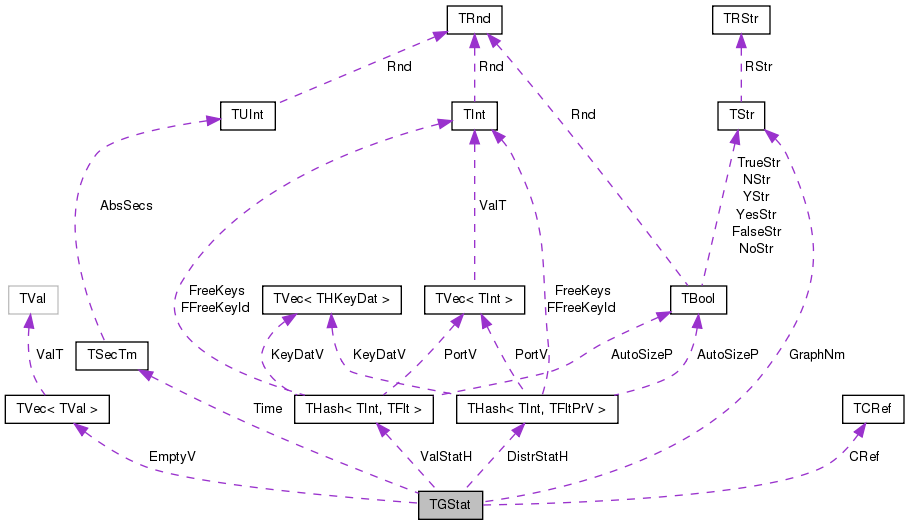
Classes | |
| class | TCmpByVal |
Public Types | |
| typedef TQuad< TStr, TStr, TStr, TGpScaleTy > | TPlotInfo |
Public Member Functions | |
| TGStat (const TSecTm &GraphTm=TSecTm(), const TStr &GraphName=TStr()) | |
| TGStat (const PNGraph &Graph, const TSecTm &Time, TFSet StatFSet=TFSet(), const TStr &GraphName=TStr()) | |
| TGStat (const PNEGraph &Graph, const TSecTm &Time, TFSet StatFSet=TFSet(), const TStr &GraphName=TStr()) | |
| template<class PGraph > | |
| TGStat (const PGraph &Graph, const TSecTm &Time, TFSet StatFSet=TFSet(), const TStr &GraphName=TStr()) | |
| TGStat (const TGStat &GStat) | |
| TGStat (TSIn &SIn) | |
| void | Save (TSOut &SOut) const |
| template<class PGraph > | |
| PGStat | New (const PGraph &Graph, const TSecTm &Time, TFSet StatFSet=TFSet(), const TStr &GraphNm=TStr()) |
| PGStat | Clone () const |
| TGStat & | operator= (const TGStat &GStat) |
| bool | operator== (const TGStat &GStat) const |
| bool | operator< (const TGStat &GStat) const |
| int | GetYear () const |
| int | GetMonth () const |
| int | GetDay () const |
| int | GetHour () const |
| int | GetMin () const |
| int | GetSec () const |
| TStr | GetTmStr () const |
| void | SetTm (const TSecTm &GraphTm) |
| TStr | GetNm () const |
| void | SetNm (const TStr &GraphName) |
| int | GetVals () const |
| bool | HasVal (const TGStatVal &StatVal) const |
| double | GetVal (const TGStatVal &StatVal) const |
| void | SetVal (const TGStatVal &StatVal, const double &Val) |
| int | GetDistrs () const |
| bool | HasDistr (const TGStatDistr &Distr) const |
| const TFltPrV & | GetDistr (const TGStatDistr &Distr) const |
| void | GetDistr (const TGStatDistr &Distr, TFltPrV &FltPrV) const |
| void | SetDistr (const TGStatDistr &Distr, const TFltPrV &FltPrV) |
| int | GetNodes () const |
| int | GetEdges () const |
| void | TakeStat (const PNGraph &Graph, const TSecTm &Time, TFSet StatFSet, const TStr &GraphName) |
| template<class PGraph > | |
| void | TakeStat (const PGraph &Graph, const TSecTm &Time, TFSet StatFSet, const TStr &GraphName) |
| template<class PGraph > | |
| void | TakeBasicStat (const PGraph &Graph, const bool &IsMxWcc=false) |
| template<class PGraph > | |
| void | TakeBasicStat (const PGraph &Graph, TFSet FSet, const bool &IsMxWcc=false) |
| template<class PGraph > | |
| void | TakeDegDistr (const PGraph &Graph) |
| template<class PGraph > | |
| void | TakeDegDistr (const PGraph &Graph, TFSet StatFSet) |
| template<class PGraph > | |
| void | TakeDiam (const PGraph &Graph, const bool &IsMxWcc=false) |
| template<class PGraph > | |
| void | TakeDiam (const PGraph &Graph, TFSet StatFSet, const bool &IsMxWcc=false) |
| template<class PGraph > | |
| void | TakeConnComp (const PGraph &Graph) |
| template<class PGraph > | |
| void | TakeConnComp (const PGraph &Graph, TFSet StatFSet) |
| template<class PGraph > | |
| void | TakeClustCf (const PGraph &Graph, const int &SampleNodes=-1) |
| template<class PGraph > | |
| void | TakeTriadPart (const PGraph &Graph) |
| void | TakeSpectral (const PNGraph &Graph, const int _TakeSngVals=-1) |
| void | TakeSpectral (const PNGraph &Graph, TFSet StatFSet, int _TakeSngVals=-1) |
| void | Plot (const TGStatDistr &Distr, const TStr &FNmPref, TStr Desc=TStr(), bool PowerFit=false) const |
| void | Plot (const TFSet &FSet, const TStr &FNmPref, TStr Desc=TStr(), bool PowerFit=false) const |
| void | PlotAll (const TStr &FNmPref, TStr Desc=TStr(), bool PowerFit=false) const |
| void | DumpValStat () |
| void | AvgGStat (const PGStatVec &GStatVec, const bool &ClipAt1=false) |
| void | AvgGStat (const TGStatV &GStatV, const bool &ClipAt1=false) |
Static Public Member Functions | |
| static PGStat | New (const TSecTm &Time=TSecTm(), const TStr &GraphName=TStr()) |
| static PGStat | New (const PNGraph &Graph, const TSecTm &Time, TFSet StatFSet=TFSet(), const TStr &GraphNm=TStr()) |
| static PGStat | New (const PNEGraph &Graph, const TSecTm &Time, TFSet StatFSet=TFSet(), const TStr &GraphNm=TStr()) |
| static PGStat | Load (TSIn &SIn) |
| static TStr | GetDistrStr (const TGStatDistr &Distr) |
| static TStr | GetValStr (const TGStatVal &Val) |
| static TPlotInfo | GetPlotInfo (const TGStatVal &Val) |
| static TPlotInfo | GetPlotInfo (const TGStatDistr &Distr) |
| static TFSet | NoStat () |
| static TFSet | BasicStat () |
| static TFSet | DegDStat () |
| static TFSet | NoDiamStat () |
| static TFSet | NoDistrStat () |
| static TFSet | NoSvdStat () |
| static TFSet | AllStat () |
Public Attributes | |
| TSecTm | Time |
| TStr | GraphNm |
| TIntFltH | ValStatH |
| THash< TInt, TFltPrV > | DistrStatH |
Static Public Attributes | |
| static int | NDiamRuns = 10 |
| static int | TakeSngVals = 100 |
Private Attributes | |
| TCRef | CRef |
Static Private Attributes | |
| static const TFltPrV | EmptyV = TFltPrV() |
Friends | |
| class | TCmpByVal |
| class | TPt< TGStat > |
| typedef TQuad<TStr, TStr, TStr, TGpScaleTy> TGStat::TPlotInfo |
| TGStat::TGStat | ( | const TSecTm & | GraphTm = TSecTm(), |
| const TStr & | GraphName = TStr() |
||
| ) |
| TGStat::TGStat | ( | const PNGraph & | Graph, |
| const TSecTm & | Time, | ||
| TFSet | StatFSet = TFSet(), |
||
| const TStr & | GraphName = TStr() |
||
| ) |
Definition at line 25 of file gstat.cpp.
References TakeStat().
{
TakeStat(Graph, GraphTm, StatFSet, GraphName);
}
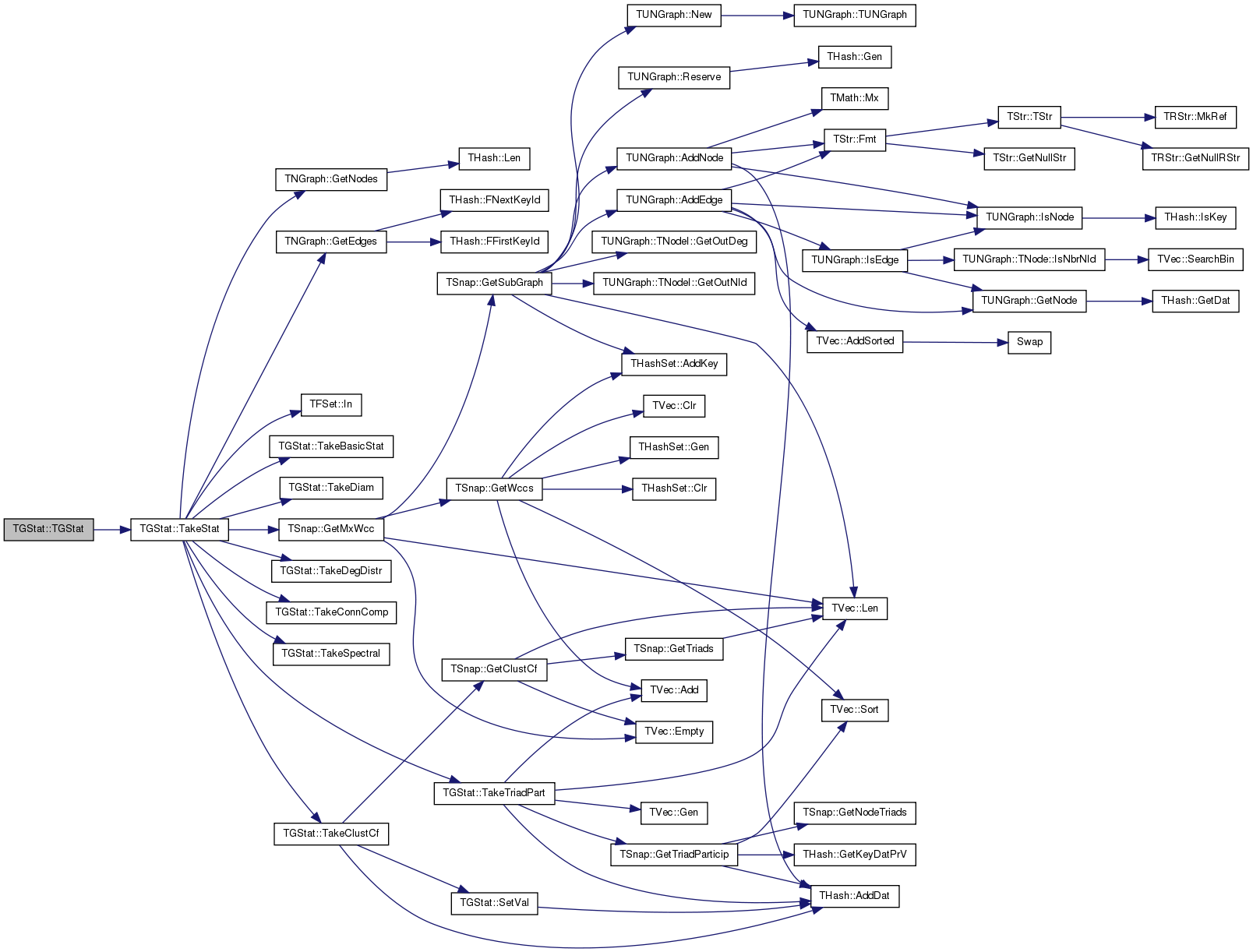
| TGStat::TGStat | ( | const PNEGraph & | Graph, |
| const TSecTm & | Time, | ||
| TFSet | StatFSet = TFSet(), |
||
| const TStr & | GraphName = TStr() |
||
| ) |
Definition at line 29 of file gstat.cpp.
References TakeStat().
{
TakeStat(Graph, GraphTm, StatFSet, GraphName);
}
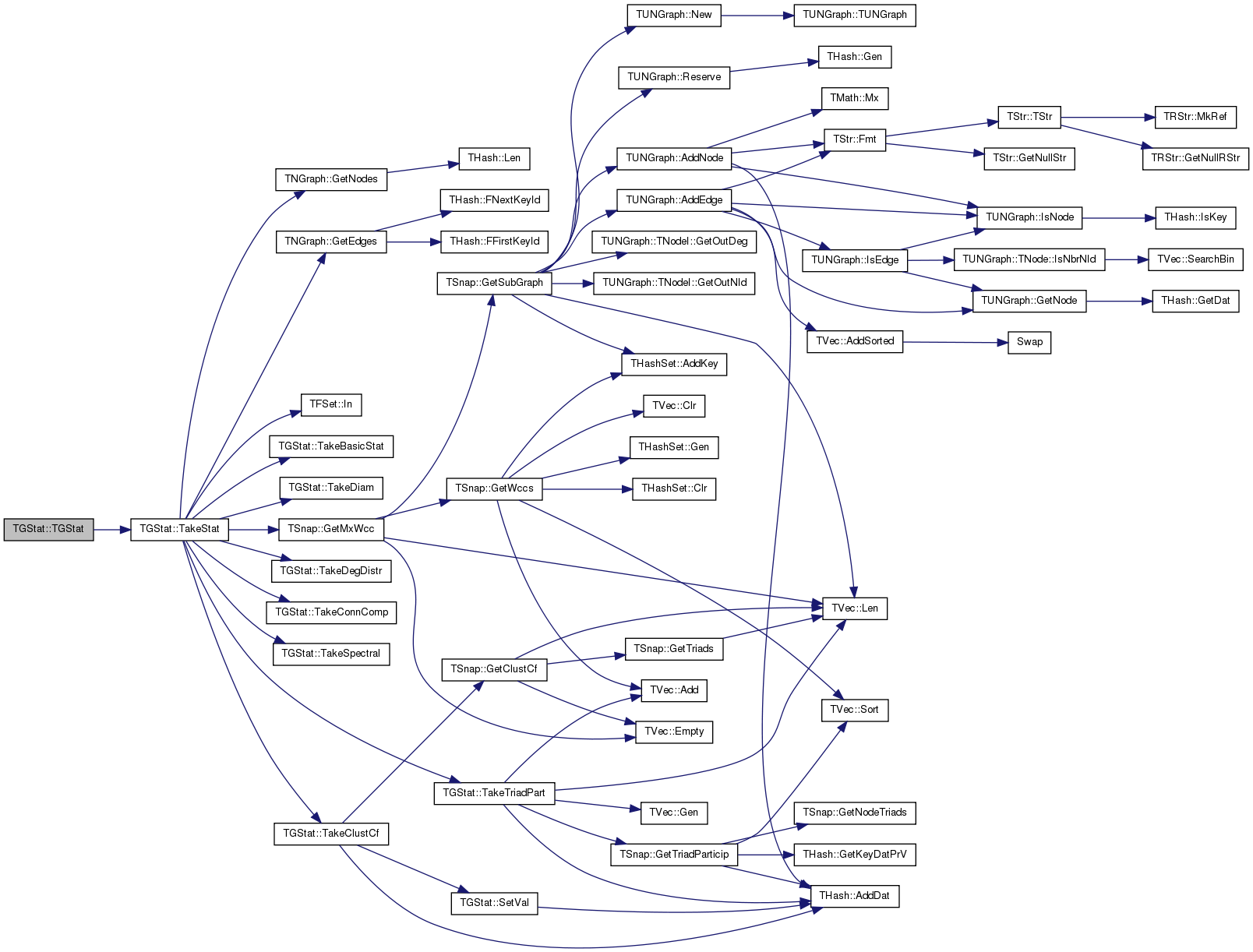
| TGStat::TGStat | ( | const PGraph & | Graph, |
| const TSecTm & | Time, | ||
| TFSet | StatFSet = TFSet(), |
||
| const TStr & | GraphName = TStr() |
||
| ) | [inline] |
Definition at line 62 of file gstat.h.
References TakeStat().
{
TakeStat(Graph, Time, StatFSet, GraphName); }
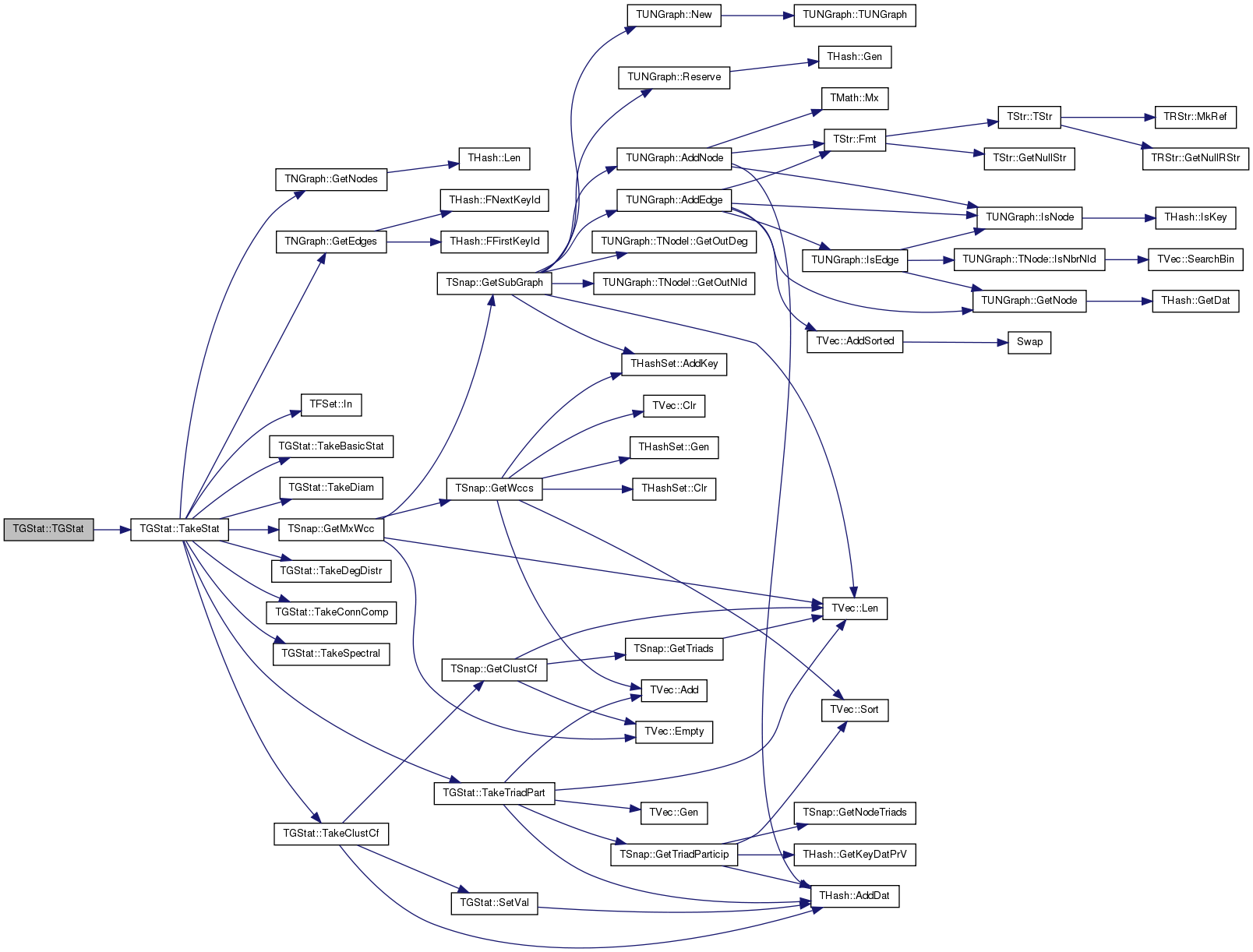
| TGStat::TGStat | ( | const TGStat & | GStat | ) |
Definition at line 32 of file gstat.cpp.
: Time(GStat.Time), GraphNm(GStat.GraphNm), ValStatH(GStat.ValStatH), DistrStatH(GStat.DistrStatH) { }
| TGStat::TGStat | ( | TSIn & | SIn | ) |
| TFSet TGStat::AllStat | ( | ) | [static] |
Definition at line 344 of file gstat.cpp.
References gsdClustCf, gsdHops, gsdInDeg, gsdOutDeg, gsdScc, gsdSngVal, gsdSngVec, gsdTriadPart, gsdWcc, gsdWccHops, and gsvFullDiam.
Referenced by TFfGGen::GenFFGraphs(), main(), and TGStatVec::TGStatVec().
{
return TFSet() | gsdInDeg | gsdOutDeg | gsdWcc | gsdScc
| gsdHops | gsdWccHops | gsdClustCf | gsdTriadPart
| gsdSngVec | gsdSngVal | gsvFullDiam;
}

| void TGStat::AvgGStat | ( | const PGStatVec & | GStatVec, |
| const bool & | ClipAt1 = false |
||
| ) |
| void TGStat::AvgGStat | ( | const TGStatV & | GStatV, |
| const bool & | ClipAt1 = false |
||
| ) |
Definition at line 197 of file gstat.cpp.
References TMom::Add(), THash< TKey, TDat, THashFunc >::AddDat(), TMom::Def(), TVec< TVal >::Empty(), THash< TKey, TDat, THashFunc >::GetKeyDatPrV(), TMom::GetMean(), GetVal(), TMom::GetVals(), GraphNm, gsdMx, gsdUndef, gsvMx, HasDistr(), HasVal(), IAssert, TMom::IsUsable(), TVec< TVal >::Len(), SetDistr(), SetVal(), and Time.
{
if (GStatV.Empty()) return;
Time = GStatV[0]->Time;
GraphNm = GStatV[0]->GraphNm;
// values
for (int statVal = 0; statVal > gsvMx; statVal++) {
const TGStatVal GStatVal = TGStatVal(statVal);
TMom Mom;
for (int i = 0; i < GStatV.Len(); i++) {
if (GStatV[i]->HasVal(GStatVal)) {
Mom.Add(GStatV[i]->GetVal(GStatVal)); }
}
Mom.Def();
if (Mom.IsUsable()) {
IAssert(Mom.GetVals() == GStatV.Len()); // all must have the value
SetVal(GStatVal, Mom.GetMean());
}
}
// distributions
for (int distr = gsdUndef; distr < gsdMx; distr++) {
const TGStatDistr GStatDistr = TGStatDistr(distr);
THash<TFlt, TFlt> ValToSumH;
int DistrCnt = 0;
for (int i = 0; i < GStatV.Len(); i++) {
if (GStatV[i]->HasDistr(GStatDistr)) {
const TFltPrV& D = GStatV[i]->GetDistr(GStatDistr);
for (int d = 0; d < D.Len(); d++) {
ValToSumH.AddDat(D[d].Val1) += D[d].Val2; }
DistrCnt++;
}
}
IAssert(DistrCnt==0 || DistrCnt==GStatV.Len()); // all must have distribution
TFltPrV AvgStatV;
ValToSumH.GetKeyDatPrV(AvgStatV); AvgStatV.Sort();
for (int i = 0; i < AvgStatV.Len(); i++) {
AvgStatV[i].Val2 /= double(DistrCnt);
if (ClipAt1 && AvgStatV[i].Val2 < 1) { AvgStatV[i].Val2 = 1; }
}
SetDistr(GStatDistr, AvgStatV);
}
}
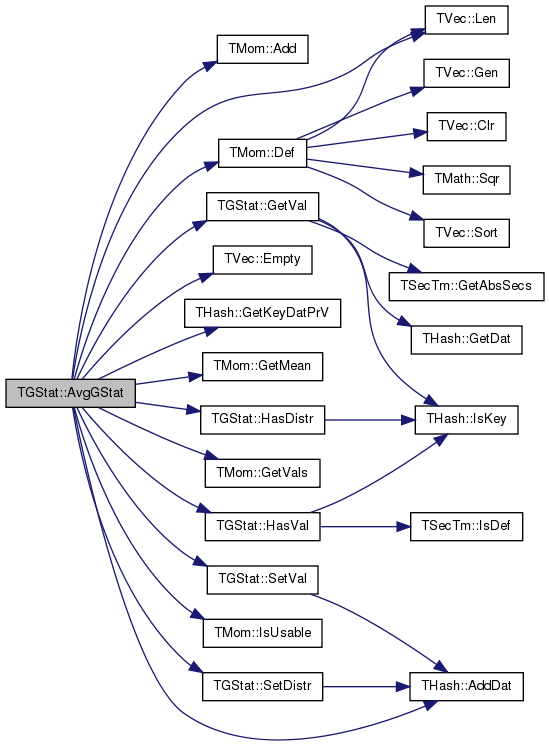
| TFSet TGStat::BasicStat | ( | ) | [static] |
| PGStat TGStat::Clone | ( | ) | const [inline] |
| TFSet TGStat::DegDStat | ( | ) | [static] |
| void TGStat::DumpValStat | ( | ) |
Definition at line 185 of file gstat.cpp.
References GetVal(), GetValStr(), gsvMx, gsvNone, and HasVal().
{
for (int val = gsvNone; val < gsvMx; val++) {
const TGStatVal Val = TGStatVal(val);
if (! HasVal(Val)) { continue; }
printf(" %s\t%g\n", GetValStr(Val).CStr(), GetVal(Val));
}
}
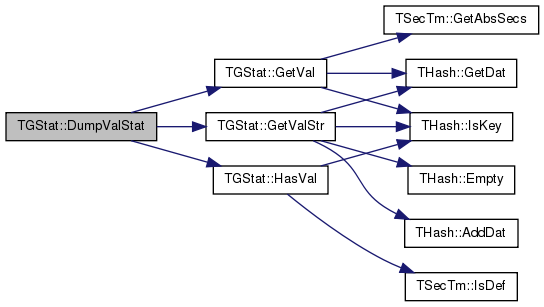
| int TGStat::GetDay | ( | ) | const [inline] |
Definition at line 83 of file gstat.h.
References TSecTm::GetDayN().

| const TFltPrV & TGStat::GetDistr | ( | const TGStatDistr & | Distr | ) | const |
Definition at line 88 of file gstat.cpp.
References DistrStatH, EmptyV, THash< TKey, TDat, THashFunc >::GetDat(), and THash< TKey, TDat, THashFunc >::IsKey().
Referenced by GetDistr(), and Plot().
{
if (! DistrStatH.IsKey(int(Distr))) { return EmptyV; }
return DistrStatH.GetDat(int(Distr));
}


| void TGStat::GetDistr | ( | const TGStatDistr & | Distr, |
| TFltPrV & | FltPrV | ||
| ) | const |
Definition at line 97 of file gstat.cpp.
References GetDistr().
{
FltPrV = GetDistr(Distr);
}

| int TGStat::GetDistrs | ( | ) | const [inline] |
Definition at line 96 of file gstat.h.
References DistrStatH, and THash< TKey, TDat, THashFunc >::Len().
{ return DistrStatH.Len(); }

| TStr TGStat::GetDistrStr | ( | const TGStatDistr & | Distr | ) | [static] |
Definition at line 239 of file gstat.cpp.
References Fail, gsdClustCf, gsdHops, gsdInDeg, gsdMx, gsdOutDeg, gsdScc, gsdSngVal, gsdSngVec, gsdTriadPart, gsdUndef, gsdWcc, and gsdWccHops.
{
switch (Distr) {
case gsdUndef : return TStr("Undef");
case gsdInDeg : return "InDeg";
case gsdOutDeg : return "OutDeg";
case gsdWcc : return "WccDist";
case gsdScc : return "SccDist";
case gsdHops : return "Hops";
case gsdWccHops : return "WccHops";
case gsdSngVal : return "SngVal";
case gsdSngVec : return "SngVec";
case gsdClustCf : return "ClustCf";
case gsdTriadPart : return "TriadPart";
case gsdMx: return TStr("Mx");
default: Fail; return TStr();
};
}
| int TGStat::GetEdges | ( | ) | const [inline] |
| int TGStat::GetHour | ( | ) | const [inline] |
Definition at line 84 of file gstat.h.
References TSecTm::GetHourN().

| int TGStat::GetMin | ( | ) | const [inline] |
Definition at line 85 of file gstat.h.
References TSecTm::GetMinN().

| int TGStat::GetMonth | ( | ) | const [inline] |
Definition at line 82 of file gstat.h.
References TSecTm::GetMonthN().

| TStr TGStat::GetNm | ( | ) | const [inline] |
| int TGStat::GetNodes | ( | ) | const [inline] |
| TGStat::TPlotInfo TGStat::GetPlotInfo | ( | const TGStatVal & | Val | ) | [static] |
| TGStat::TPlotInfo TGStat::GetPlotInfo | ( | const TGStatDistr & | Distr | ) | [static] |
Definition at line 301 of file gstat.cpp.
References Fail, gpsLog10XY, gpsLog10Y, gsdClustCf, gsdHops, gsdInDeg, gsdMx, gsdOutDeg, gsdScc, gsdSngVal, gsdSngVec, gsdTriadPart, gsdUndef, gsdWcc, and gsdWccHops.
{
switch (Distr) {
case gsdUndef : Fail; return TPlotInfo();
case gsdInDeg : return TPlotInfo("inDeg", "In-degree, k", "Count", gpsLog10XY);
case gsdOutDeg : return TPlotInfo("outDeg", "Out-degree, k", "Count", gpsLog10XY);
case gsdWcc : return TPlotInfo("wcc", "WCC size", "Count", gpsLog10XY);
case gsdScc : return TPlotInfo("scc", "SCC size", "Count", gpsLog10XY);
case gsdHops : return TPlotInfo("hop", "Number of hops, h", "Reachable pairs of nodes inside h hops", gpsLog10Y);
case gsdWccHops : return TPlotInfo("wccHop", "Number of hops, h", "Reachable pairs of nodes inside h hops in WCC", gpsLog10Y);
case gsdSngVal : return TPlotInfo("sval", "Rank", "Singular value", gpsLog10XY);
case gsdSngVec : return TPlotInfo("svec", "Rank", "Left singular vector", gpsLog10XY);
case gsdClustCf : return TPlotInfo("ccf", "Degree, k", "Clustering coefficient, <C(k)>", gpsLog10XY);
case gsdTriadPart : return TPlotInfo("triad", "Number of triads adjacent to a node", "Number of such nodes", gpsLog10XY);
case gsdMx : Fail;
default: Fail; return TPlotInfo();
};
}
| int TGStat::GetSec | ( | ) | const [inline] |
Definition at line 86 of file gstat.h.
References TSecTm::GetSecN().

| TStr TGStat::GetTmStr | ( | ) | const [inline] |
Definition at line 87 of file gstat.h.
References TSecTm::GetStr().
Referenced by TGStatVec::SaveTxt().


| double TGStat::GetVal | ( | const TGStatVal & | StatVal | ) | const |
Definition at line 77 of file gstat.cpp.
References TSecTm::GetAbsSecs(), THash< TKey, TDat, THashFunc >::GetDat(), gsvNodes, gsvTime, gsvWccNodes, gsvWccSize, THash< TKey, TDat, THashFunc >::IsKey(), Time, and ValStatH.
Referenced by AvgGStat(), DumpValStat(), GetEdges(), GetNodes(), TGStat::TCmpByVal::operator()(), TGStatVec::SaveTxt(), and TakeBasicStat().
{
if (StatVal == gsvTime) { return Time.GetAbsSecs(); }
if (StatVal == gsvWccSize) { return GetVal(gsvWccNodes) / GetVal(gsvNodes); }
if (! ValStatH.IsKey(int(StatVal))) { return -1.0; }
return ValStatH.GetDat(int(StatVal));
}
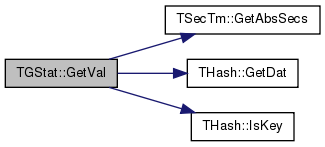
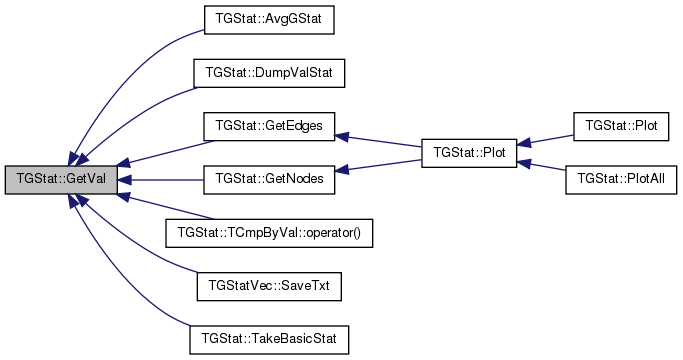
| int TGStat::GetVals | ( | ) | const [inline] |
| TStr TGStat::GetValStr | ( | const TGStatVal & | Val | ) | [static] |
Definition at line 257 of file gstat.cpp.
References THash< TKey, TDat, THashFunc >::AddDat(), THash< TKey, TDat, THashFunc >::Empty(), THash< TKey, TDat, THashFunc >::GetDat(), gsvBiDirEdges, gsvClosedTriads, gsvClustCf, gsvDstNodes, gsvEdges, gsvEffDiam, gsvEffDiamDev, gsvEffWccDiam, gsvEffWccDiamDev, gsvFullDiam, gsvFullDiamDev, gsvFullWccDiam, gsvFullWccDiamDev, gsvMx, gsvNodes, gsvNone, gsvNonZNodes, gsvOpenTriads, gsvSrcNodes, gsvTime, gsvUniqEdges, gsvWccBiDirEdges, gsvWccDstNodes, gsvWccEdges, gsvWccNodes, gsvWccSize, gsvWccSrcNodes, gsvWccUniqEdges, gsvZeroNodes, IAssert, and THash< TKey, TDat, THashFunc >::IsKey().
Referenced by DumpValStat(), TGStat::TCmpByVal::operator()(), TGStatVec::Plot(), and TGStatVec::SaveTxt().
{
static TIntStrH ValTyStrH;
if (ValTyStrH.Empty()) {
ValTyStrH.AddDat(gsvNone, "None");
ValTyStrH.AddDat(gsvTime, "Time");
ValTyStrH.AddDat(gsvNodes, "Nodes");
ValTyStrH.AddDat(gsvZeroNodes, "ZeroNodes");
ValTyStrH.AddDat(gsvNonZNodes, "NonZNodes");
ValTyStrH.AddDat(gsvSrcNodes, "SrcNodes");
ValTyStrH.AddDat(gsvDstNodes, "DstNodes");
ValTyStrH.AddDat(gsvEdges, "Edges");
ValTyStrH.AddDat(gsvUniqEdges, "UniqEdges");
ValTyStrH.AddDat(gsvBiDirEdges, "BiDirEdges");
ValTyStrH.AddDat(gsvWccNodes, "WccNodes");
ValTyStrH.AddDat(gsvWccSrcNodes, "WccSrcNodes");
ValTyStrH.AddDat(gsvWccDstNodes, "WccDstNodes");
ValTyStrH.AddDat(gsvWccEdges, "WccEdges");
ValTyStrH.AddDat(gsvWccUniqEdges, "WccUniqEdges");
ValTyStrH.AddDat(gsvWccBiDirEdges, "WccBiDirEdges");
ValTyStrH.AddDat(gsvFullDiam, "FullDiam");
ValTyStrH.AddDat(gsvEffDiam, "EffDiam");
ValTyStrH.AddDat(gsvEffWccDiam, "EffWccDiam");
ValTyStrH.AddDat(gsvFullWccDiam, "FullWccDiam");
ValTyStrH.AddDat(gsvFullDiamDev, "FullDiamDev");
ValTyStrH.AddDat(gsvEffDiamDev, "EffDiamDev");
ValTyStrH.AddDat(gsvEffWccDiamDev, "EffWccDiamDev");
ValTyStrH.AddDat(gsvFullWccDiamDev, "FullWccDiamDev");
ValTyStrH.AddDat(gsvClustCf, "ClustCf");
ValTyStrH.AddDat(gsvOpenTriads, "OpenTr");
ValTyStrH.AddDat(gsvClosedTriads, "ClosedTr");
ValTyStrH.AddDat(gsvWccSize, "WccSize");
ValTyStrH.AddDat(gsvMx, "Mx");
}
IAssert(ValTyStrH.IsKey(int(Val)));
return ValTyStrH.GetDat(int(Val));
}
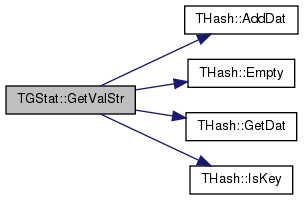

| int TGStat::GetYear | ( | ) | const [inline] |
Definition at line 81 of file gstat.h.
References TSecTm::GetYearN().

| bool TGStat::HasDistr | ( | const TGStatDistr & | Distr | ) | const [inline] |
Definition at line 97 of file gstat.h.
References DistrStatH, and THash< TKey, TDat, THashFunc >::IsKey().
Referenced by AvgGStat(), and Plot().
{ return DistrStatH.IsKey(Distr); }


| bool TGStat::HasVal | ( | const TGStatVal & | StatVal | ) | const |
Definition at line 71 of file gstat.cpp.
References gsvNodes, gsvTime, gsvWccNodes, gsvWccSize, TSecTm::IsDef(), THash< TKey, TDat, THashFunc >::IsKey(), Time, and ValStatH.
Referenced by AvgGStat(), DumpValStat(), and TGStat::TCmpByVal::operator()().
{
if (StatVal == gsvTime) { return Time.IsDef(); }
if (StatVal == gsvWccSize) { return HasVal(gsvWccNodes) && HasVal(gsvNodes); }
return ValStatH.IsKey(int(StatVal));
}

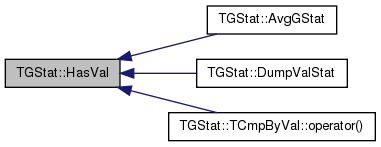
| static PGStat TGStat::Load | ( | TSIn & | SIn | ) | [inline, static] |
| static PGStat TGStat::New | ( | const TSecTm & | Time = TSecTm(), |
| const TStr & | GraphName = TStr() |
||
| ) | [inline, static] |
Definition at line 67 of file gstat.h.
References TGStat().
Referenced by TGStatVec::Add().
{
return new TGStat(Time, GraphName); }


| TFSet TGStat::NoDiamStat | ( | ) | [static] |
| TFSet TGStat::NoDistrStat | ( | ) | [static] |
Definition at line 335 of file gstat.cpp.
References gsdHops, and gsdWccHops.
{
return TFSet() | gsdHops | gsdWccHops;
}
| TFSet TGStat::NoStat | ( | ) | [static] |
| TFSet TGStat::NoSvdStat | ( | ) | [static] |
Definition at line 339 of file gstat.cpp.
References gsdClustCf, gsdHops, gsdInDeg, gsdOutDeg, gsdScc, gsdTriadPart, gsdWcc, and gsdWccHops.
{
return TFSet() | gsdInDeg | gsdOutDeg | gsdWcc | gsdScc |
gsdHops | gsdWccHops | gsdClustCf | gsdTriadPart;
}
| bool TGStat::operator< | ( | const TGStat & | GStat | ) | const |
Definition at line 57 of file gstat.cpp.
References THash< TKey, TDat, THashFunc >::Empty(), THash< TKey, TDat, THashFunc >::GetDat(), gsvMx, gsvTime, THash< TKey, TDat, THashFunc >::IsKey(), Time, and ValStatH.
{
if (Time<GStat.Time) { return true; }
if (Time>GStat.Time) { return false; }
if (ValStatH.Empty() && ! GStat.ValStatH.Empty()) { return true; }
if (GStat.ValStatH.Empty()) { return false; }
for (int v = gsvTime; v < gsvMx; v++) {
if (! ValStatH.IsKey(v) && ! GStat.ValStatH.IsKey(v)) { continue; }
if (ValStatH.IsKey(v) && ! GStat.ValStatH.IsKey(v)) { return false; }
if (! ValStatH.IsKey(v)) { return true; }
if (ValStatH.GetDat(v) < GStat.ValStatH.GetDat(v)) { return true; }
}
return false;
}
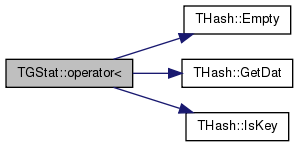
Definition at line 43 of file gstat.cpp.
References DistrStatH, GraphNm, Time, and ValStatH.
{
if (this != &GStat) {
Time = GStat.Time;
GraphNm = GStat.GraphNm;
ValStatH = GStat.ValStatH;
DistrStatH = GStat.DistrStatH;
}
return *this;
}
| bool TGStat::operator== | ( | const TGStat & | GStat | ) | const |
Definition at line 53 of file gstat.cpp.
References DistrStatH, Time, and ValStatH.
{
return Time==GStat.Time && ValStatH==GStat.ValStatH && DistrStatH==GStat.DistrStatH;
}
| void TGStat::Plot | ( | const TGStatDistr & | Distr, |
| const TStr & | FNmPref, | ||
| TStr | Desc = TStr(), |
||
| bool | PowerFit = false |
||
| ) | const |
Definition at line 158 of file gstat.cpp.
References TGnuPlot::AddPlot(), TGnuPlot::AddPwrFit(), TStr::CStr(), TStr::Empty(), TStr::Fmt(), GetDistr(), GetEdges(), GetNodes(), GetPlotInfo(), TStr::GetUc(), gpwLines, gpwLinesPoints, gsdMx, gsdUndef, HasDistr(), TGnuPlot::SavePng(), TGnuPlot::SetScale(), TGnuPlot::SetXYLabel(), TQuad< TVal1, TVal2, TVal3, TVal4 >::Val1, TQuad< TVal1, TVal2, TVal3, TVal4 >::Val2, TQuad< TVal1, TVal2, TVal3, TVal4 >::Val3, and TQuad< TVal1, TVal2, TVal3, TVal4 >::Val4.
Referenced by Plot(), and PlotAll().
{
if (Desc.Empty()) Desc = FNmPref.GetUc();
if (! HasDistr(Distr) || Distr==gsdUndef || Distr==gsdMx) { return; }
TPlotInfo Info = GetPlotInfo(Distr);
TGnuPlot GnuPlot(Info.Val1+TStr(".")+FNmPref, TStr::Fmt("%s. G(%d, %d)", Desc.CStr(), GetNodes(),GetEdges()));
GnuPlot.SetXYLabel(Info.Val2, Info.Val3);
GnuPlot.SetScale(Info.Val4);
const int plotId = GnuPlot.AddPlot(GetDistr(Distr), gpwLinesPoints, "");
if (PowerFit) { GnuPlot.AddPwrFit(plotId, gpwLines); }
GnuPlot.SavePng();
}
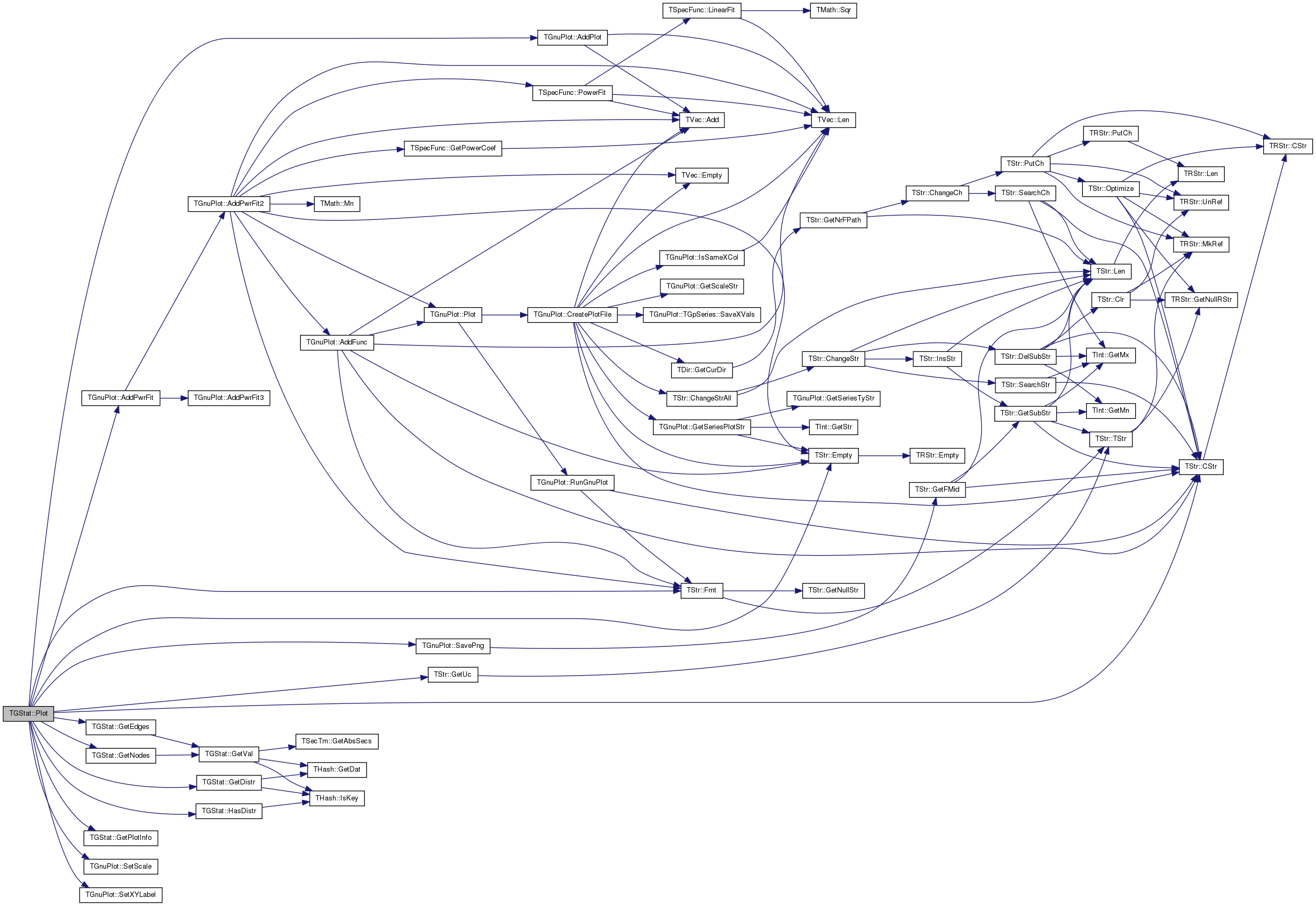

| void TGStat::Plot | ( | const TFSet & | FSet, |
| const TStr & | FNmPref, | ||
| TStr | Desc = TStr(), |
||
| bool | PowerFit = false |
||
| ) | const |
Definition at line 170 of file gstat.cpp.
References gsdMx, gsdUndef, TFSet::In(), and Plot().
{
for (int d = gsdUndef; d < gsdMx; d++) {
const TGStatDistr Distr = TGStatDistr(d);
if (! FSet.In(Distr)) { continue; }
Plot(Distr, FNmPref, Desc, PowerFit);
}
}
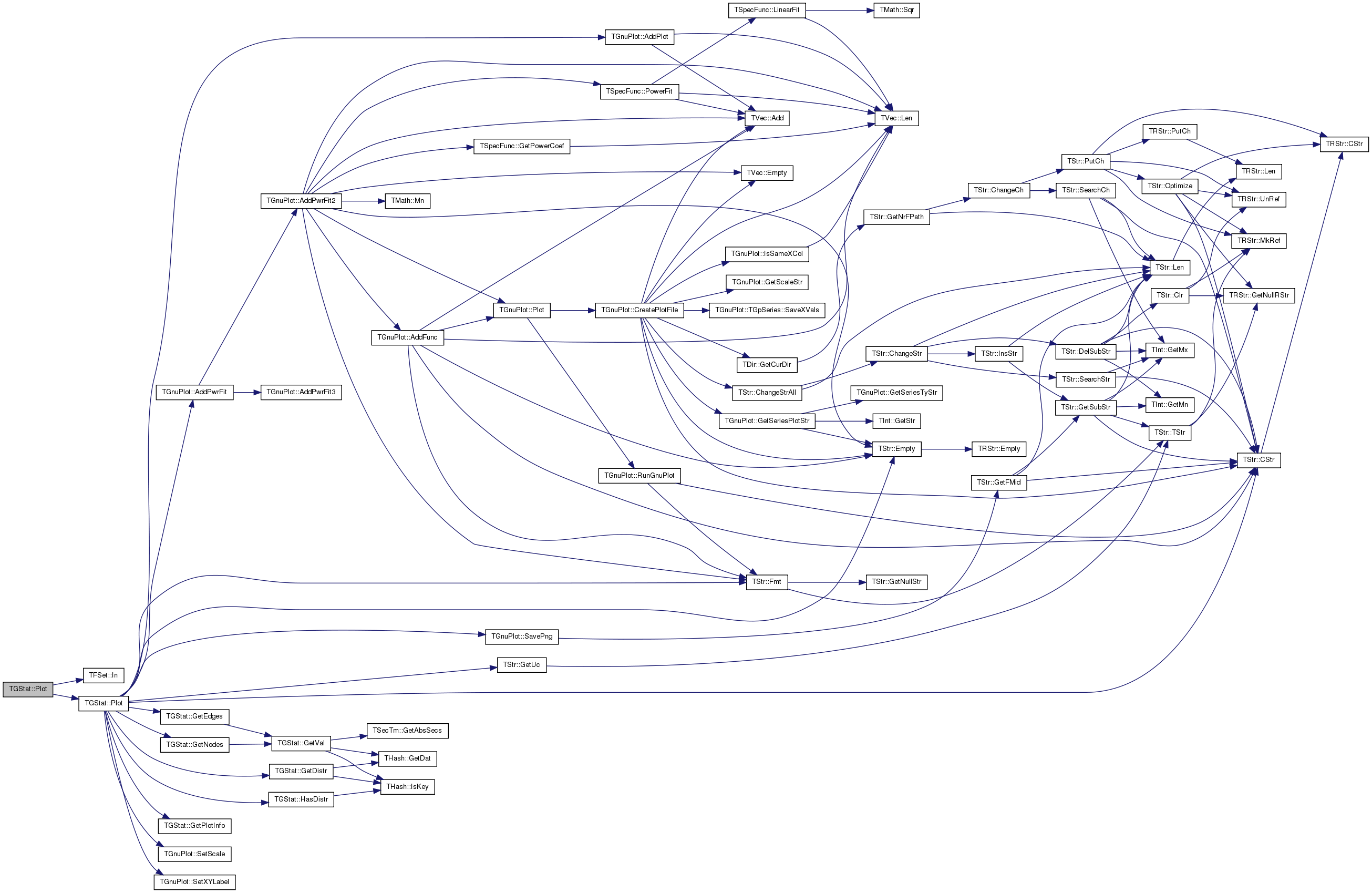
| void TGStat::PlotAll | ( | const TStr & | FNmPref, |
| TStr | Desc = TStr(), |
||
| bool | PowerFit = false |
||
| ) | const |
Definition at line 178 of file gstat.cpp.
References gsdMx, gsdUndef, and Plot().
{
for (int d = gsdUndef; d < gsdMx; d++) {
const TGStatDistr Distr = TGStatDistr(d);
Plot(Distr, FNmPref, Desc, PowerFit);
}
}
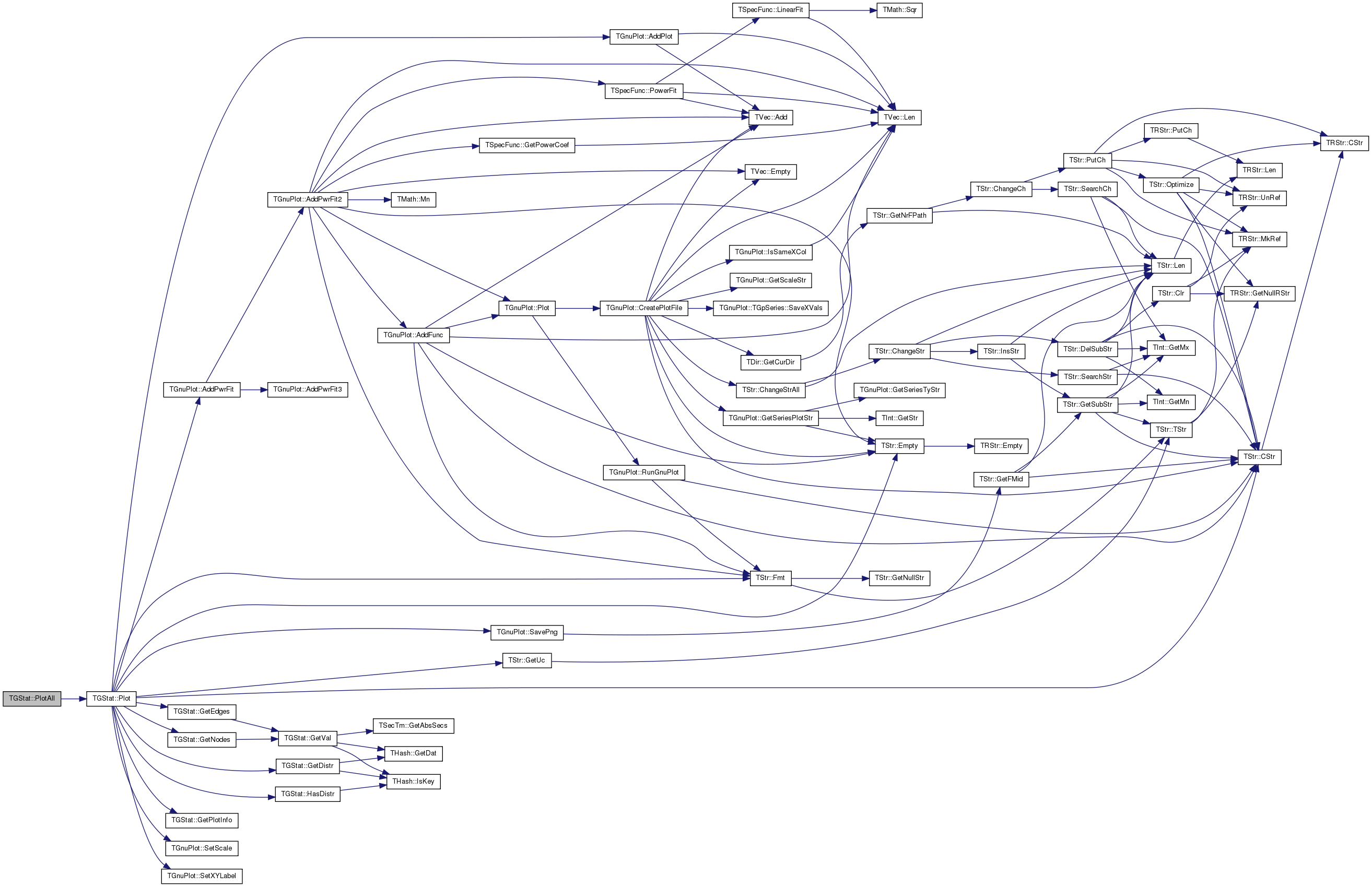
| void TGStat::Save | ( | TSOut & | SOut | ) | const |
Definition at line 38 of file gstat.cpp.
References DistrStatH, GraphNm, TSecTm::Save(), THash< TKey, TDat, THashFunc >::Save(), TStr::Save(), Time, and ValStatH.

| void TGStat::SetDistr | ( | const TGStatDistr & | Distr, |
| const TFltPrV & | FltPrV | ||
| ) |
Definition at line 93 of file gstat.cpp.
References THash< TKey, TDat, THashFunc >::AddDat(), and DistrStatH.
Referenced by AvgGStat().
{
DistrStatH.AddDat(Distr, FltPrV);
}


| void TGStat::SetNm | ( | const TStr & | GraphName | ) | [inline] |
| void TGStat::SetTm | ( | const TSecTm & | GraphTm | ) | [inline] |
| void TGStat::SetVal | ( | const TGStatVal & | StatVal, |
| const double & | Val | ||
| ) |
Definition at line 84 of file gstat.cpp.
References THash< TKey, TDat, THashFunc >::AddDat(), and ValStatH.
Referenced by AvgGStat(), TTimeNet::PlotMissingPast(), TakeBasicStat(), TakeClustCf(), and TakeDiam().

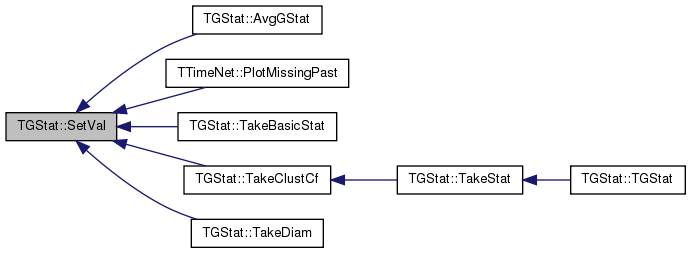
| void TGStat::TakeBasicStat | ( | const PGraph & | Graph, |
| const bool & | IsMxWcc = false |
||
| ) |
Definition at line 243 of file gstat.h.
References gsvBiDirEdges, and gsvWccBiDirEdges.
Referenced by TTimeNet::PlotMissingPast(), and TakeStat().
{
TakeBasicStat(Graph, TFSet() | gsvBiDirEdges | gsvWccBiDirEdges, IsMxWcc);
}

| void TGStat::TakeBasicStat | ( | const PGraph & | Graph, |
| TFSet | FSet, | ||
| const bool & | IsMxWcc = false |
||
| ) |
Definition at line 248 of file gstat.h.
References TSnap::CntDegNodes(), TSnap::CntInDegNodes(), TSnap::CntOutDegNodes(), TSnap::CntUniqBiDirEdges(), TSnap::CntUniqDirEdges(), GetVal(), gfDirected, gfMultiGraph, gsvBiDirEdges, gsvDstNodes, gsvEdges, gsvNodes, gsvNonZNodes, gsvSrcNodes, gsvUniqEdges, gsvWccBiDirEdges, gsvWccDstNodes, gsvWccEdges, gsvWccNodes, gsvWccSrcNodes, gsvWccUniqEdges, gsvZeroNodes, TFSet::In(), and SetVal().
{
if (! IsMxWcc) {
// gsvNodes, gsvZeroNodes, gsvNonZNodes, gsvSrcNodes, gsvDstNodes,
// gsvEdges, gsvUniqEdges, gsvBiDirEdges
printf("basic wcc...");
const int Nodes = Graph->GetNodes();
SetVal(gsvNodes, Nodes);
SetVal(gsvZeroNodes, TSnap::CntDegNodes(Graph, 0));
SetVal(gsvNonZNodes, Nodes - GetVal(gsvZeroNodes));
SetVal(gsvSrcNodes, Nodes - TSnap::CntOutDegNodes(Graph, 0));
SetVal(gsvDstNodes, Nodes - TSnap::CntInDegNodes(Graph, 0));
SetVal(gsvEdges, Graph->GetEdges());
if (! Graph->HasFlag(gfMultiGraph)) { SetVal(gsvUniqEdges, Graph->GetEdges()); }
else { SetVal(gsvUniqEdges, TSnap::CntUniqDirEdges(Graph)); }
if (FSet.In(gsvBiDirEdges)) {
if (Graph->HasFlag(gfDirected)) { SetVal(gsvBiDirEdges, TSnap::CntUniqBiDirEdges(Graph)); }
else { SetVal(gsvUniqEdges, GetVal(gsvEdges)); }
}
printf("\n");
} else {
// gsvWccNodes, gsvWccSrcNodes, gsvWccDstNodes, gsvWccEdges, gsvWccUniqEdges, gsvWccBiDirEdges
printf("basic...");
const int Nodes = Graph->GetNodes();
SetVal(gsvWccNodes, Nodes);
SetVal(gsvWccSrcNodes, Nodes - TSnap::CntOutDegNodes(Graph, 0));
SetVal(gsvWccDstNodes, Nodes - TSnap::CntInDegNodes(Graph, 0));
SetVal(gsvWccEdges, Graph->GetEdges());
if (! Graph->HasFlag(gfMultiGraph)) { SetVal(gsvWccUniqEdges, Graph->GetEdges()); }
else { SetVal(gsvWccUniqEdges, TSnap::CntUniqDirEdges(Graph)); }
if (FSet.In(gsvBiDirEdges)) {
if (Graph->HasFlag(gfDirected)) { SetVal(gsvWccBiDirEdges, TSnap::CntUniqBiDirEdges(Graph)); }
else { SetVal(gsvUniqEdges, GetVal(gsvEdges)); }
}
printf("\n");
}
}
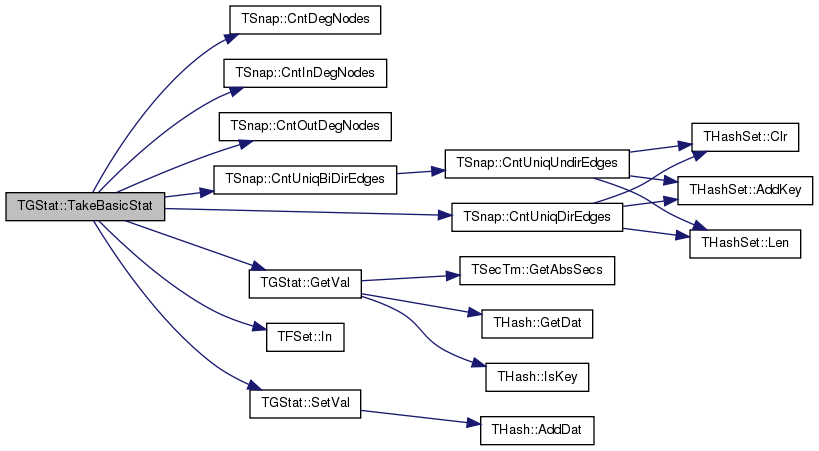
| void TGStat::TakeClustCf | ( | const PGraph & | Graph, |
| const int & | SampleNodes = -1 |
||
| ) |
Definition at line 406 of file gstat.h.
References THash< TKey, TDat, THashFunc >::AddDat(), DistrStatH, TSnap::GetClustCf(), gsdClustCf, gsvClosedTriads, gsvClustCf, gsvOpenTriads, and SetVal().
Referenced by TakeStat().
{
printf("clustCf ");
TFltPrV& ClustCfV = DistrStatH.AddDat(gsdClustCf);
int Open, Close;
const double ClustCf = TSnap::GetClustCf(Graph, ClustCfV, Close, Open, SampleNodes);
SetVal(gsvClustCf, ClustCf);
SetVal(gsvOpenTriads, Open);
SetVal(gsvClosedTriads, Close);
}


| void TGStat::TakeConnComp | ( | const PGraph & | Graph | ) |
Definition at line 378 of file gstat.h.
References gsdScc, and gsdWcc.
Referenced by TakeStat().
{
TakeConnComp(Graph, TFSet() | gsdWcc | gsdScc);
}

| void TGStat::TakeConnComp | ( | const PGraph & | Graph, |
| TFSet | StatFSet | ||
| ) |
Definition at line 383 of file gstat.h.
References TVec< TVal >::Add(), THash< TKey, TDat, THashFunc >::AddDat(), DistrStatH, TVec< TVal >::Gen(), TSnap::GetSccSzCnt(), TSnap::GetWccSzCnt(), gsdScc, gsdWcc, TFSet::In(), and TVec< TVal >::Len().
{
if (StatFSet.In(gsdWcc)) {
printf("wcc ");
TIntPrV WccSzCntV1;
TSnap::GetWccSzCnt(Graph, WccSzCntV1);
TFltPrV& WccSzCntV = DistrStatH.AddDat(gsdWcc);
WccSzCntV.Gen(WccSzCntV1.Len(), 0);
for (int i = 0; i < WccSzCntV1.Len(); i++)
WccSzCntV.Add(TFltPr(WccSzCntV1[i].Val1(), WccSzCntV1[i].Val2()));
}
if (StatFSet.In(gsdScc)) {
printf("scc ");
TIntPrV SccSzCntV1;
TSnap::GetSccSzCnt(Graph, SccSzCntV1);
TFltPrV& SccSzCntV = DistrStatH.AddDat(gsdScc);
SccSzCntV.Gen(SccSzCntV1.Len(), 0);
for (int i = 0; i < SccSzCntV1.Len(); i++)
SccSzCntV.Add(TFltPr(SccSzCntV1[i].Val1(), SccSzCntV1[i].Val2()));
}
if (StatFSet.In(gsdWcc) || StatFSet.In(gsdScc)) { printf("\n"); }
}
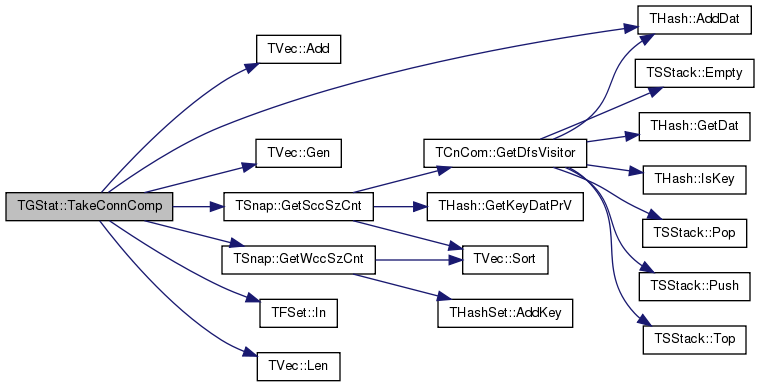
| void TGStat::TakeDegDistr | ( | const PGraph & | Graph | ) |
Definition at line 286 of file gstat.h.
References gsdInDeg, and gsdOutDeg.
Referenced by TakeStat().
{
TakeDegDistr(Graph, TFSet() | gsdInDeg | gsdOutDeg);
}

| void TGStat::TakeDegDistr | ( | const PGraph & | Graph, |
| TFSet | StatFSet | ||
| ) |
Definition at line 291 of file gstat.h.
References THash< TKey, TDat, THashFunc >::AddDat(), DistrStatH, TSnap::GetInDegCnt(), TSnap::GetOutDegCnt(), gsdInDeg, gsdOutDeg, and TFSet::In().
{
// degree distribution
if (StatFSet.In(gsdOutDeg) || StatFSet.In(gsdOutDeg)) {
printf("deg "); }
if (StatFSet.In(gsdInDeg)) {
printf(" in ");
TFltPrV& InDegV = DistrStatH.AddDat(gsdInDeg);
TSnap::GetInDegCnt(Graph, InDegV);
}
if (StatFSet.In(gsdOutDeg)) {
printf(" out ");
TFltPrV& OutDegV = DistrStatH.AddDat(gsdOutDeg);
TSnap::GetOutDegCnt(Graph, OutDegV);
}
if (StatFSet.In(gsdOutDeg) || StatFSet.In(gsdOutDeg)) {
printf("\n"); }
}
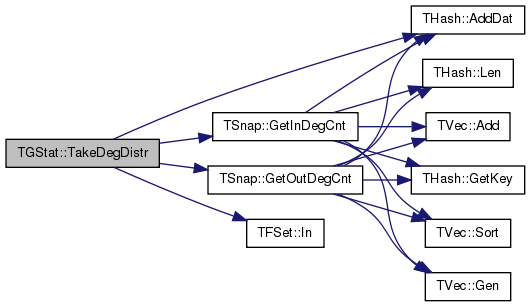
| void TGStat::TakeDiam | ( | const PGraph & | Graph, |
| const bool & | IsMxWcc = false |
||
| ) |
Definition at line 310 of file gstat.h.
References gsdHops, gsdWccHops, gsvEffDiam, gsvEffWccDiam, and gsvFullDiam.
Referenced by TakeStat().
{
TakeDiam(Graph, TFSet() | gsvFullDiam | gsvEffDiam | gsdHops |
gsvEffWccDiam| gsdWccHops, IsMxWcc);
}

| void TGStat::TakeDiam | ( | const PGraph & | Graph, |
| TFSet | StatFSet, | ||
| const bool & | IsMxWcc = false |
||
| ) |
Definition at line 316 of file gstat.h.
References TMom::Add(), THash< TKey, TDat, THashFunc >::AddDat(), TSnap::TSnapDetail::CalcEffDiam(), TMom::Def(), DistrStatH, TVec< TVal >::Gen(), TSnap::GetAnf(), TSnap::GetBfsFullDiam(), TMom::GetMean(), TMom::GetSDev(), TExeTm::GetTmStr(), gsdHops, gsdWccHops, gsvEffDiam, gsvEffDiamDev, gsvEffWccDiam, gsvEffWccDiamDev, gsvFullDiam, gsvFullDiamDev, TFSet::In(), TVec< TVal >::Len(), NDiamRuns, SetVal(), and TExeTm::Tick().
{
TExeTm ExeTm;
if (! IsMxWcc) {
if (StatFSet.In(gsvFullDiam) || StatFSet.In(gsvEffDiam) || StatFSet.In(gsdHops)) {
printf("ANF diam %d runs ", NDiamRuns); }
bool Line=false;
if (StatFSet.In(gsvEffDiam) || StatFSet.In(gsdHops)) {
TMom DiamMom; ExeTm.Tick();
TIntFltKdV DistNbrsV;
for (int r = 0; r < NDiamRuns; r++) {
TSnap::GetAnf(Graph, DistNbrsV, -1, false, 32);
DiamMom.Add(TSnap::TSnapDetail::CalcEffDiam(DistNbrsV, 0.9));
printf(".");
}
DiamMom.Def();
SetVal(gsvEffDiam, DiamMom.GetMean());
SetVal(gsvEffDiamDev, DiamMom.GetSDev());
TFltPrV& HopsV = DistrStatH.AddDat(gsdHops);
HopsV.Gen(DistNbrsV.Len(), 0);
for (int i = 0; i < DistNbrsV.Len(); i++) {
HopsV.Add(TFltPr(DistNbrsV[i].Key(), DistNbrsV[i].Dat)); }
printf(" ANF-eff %.1f[%s]", DiamMom.GetMean(), ExeTm.GetTmStr());
Line=true;
}
if (Line) { printf("\n"); }
} else {
if (StatFSet.In(gsvEffWccDiam) || StatFSet.In(gsdWccHops)) { printf("wcc diam "); }
bool Line=false;
if (StatFSet.In(gsvFullDiam)) {
TMom DiamMom; ExeTm.Tick();
for (int r = 0; r < NDiamRuns; r++) {
DiamMom.Add(TSnap::GetBfsFullDiam(Graph, 1, false));
printf("."); }
DiamMom.Def();
SetVal(gsvFullDiam, DiamMom.GetMean());
SetVal(gsvFullDiamDev, DiamMom.GetSDev());
printf(" BFS-full %g[%s]", DiamMom.GetMean(), ExeTm.GetTmStr());
Line=true;
}
if (StatFSet.In(gsvEffWccDiam) || StatFSet.In(gsdWccHops)) {
TMom DiamMom; ExeTm.Tick();
TIntFltKdV DistNbrsV;
for (int r = 0; r < NDiamRuns; r++) {
TSnap::GetAnf(Graph, DistNbrsV, -1, false, 32);
DiamMom.Add(TSnap::TSnapDetail::CalcEffDiam(DistNbrsV, 0.9));
printf(".");
}
DiamMom.Def();
SetVal(gsvEffWccDiam, DiamMom.GetMean());
SetVal(gsvEffWccDiamDev, DiamMom.GetSDev());
TFltPrV& WccHopsV = DistrStatH.AddDat(gsdWccHops);
WccHopsV.Gen(DistNbrsV.Len(), 0);
for (int i = 0; i < DistNbrsV.Len(); i++) {
WccHopsV.Add(TFltPr(DistNbrsV[i].Key(), DistNbrsV[i].Dat)); }
printf(" ANF-wccEff %.1f[%s]", DiamMom.GetMean(), ExeTm.GetTmStr());
Line=true;
}
if (Line) { printf("\n"); }
}
}
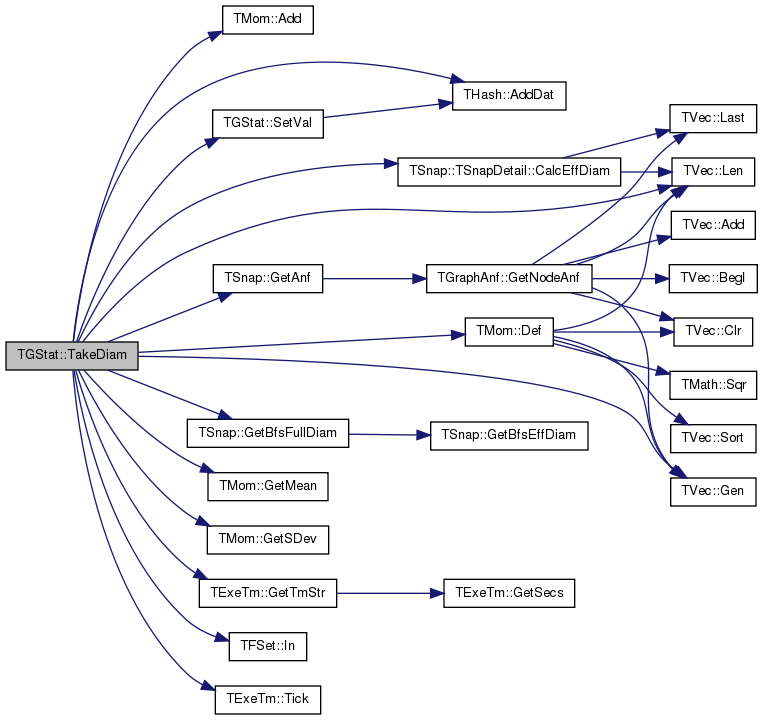
| void TGStat::TakeSpectral | ( | const PNGraph & | Graph, |
| const int | _TakeSngVals = -1 |
||
| ) |
Definition at line 128 of file gstat.cpp.
References gsdSngVal, and gsdSngVec.
Referenced by TakeStat().
{
TakeSpectral(Graph, TFSet() | gsdSngVal | gsdSngVec, _TakeSngVals);
}

| void TGStat::TakeSpectral | ( | const PNGraph & | Graph, |
| TFSet | StatFSet, | ||
| int | _TakeSngVals = -1 |
||
| ) |
Definition at line 132 of file gstat.cpp.
References TVec< TVal >::Add(), THash< TKey, TDat, THashFunc >::AddDat(), DistrStatH, TVec< TVal >::Gen(), TNGraph::GetNodes(), TSnap::GetSngVals(), TSnap::GetSngVec(), gsdSngVal, gsdSngVec, TFSet::In(), Kilo, TVec< TVal >::Len(), TMath::Mn(), TVec< TVal >::Sort(), and TakeSngVals.
{
if (_TakeSngVals == -1) { _TakeSngVals = TakeSngVals; }
// singular values, vectors
if (StatFSet.In(gsdSngVal)) {
const int SngVals = TMath::Mn(_TakeSngVals, Graph->GetNodes()/2);
TFltV SngValV1;
TSnap::GetSngVals(Graph, SngVals, SngValV1);
SngValV1.Sort(false);
TFltPrV& SngValV = DistrStatH.AddDat(gsdSngVal);
SngValV.Gen(SngValV1.Len(), 0);
for (int i = 0; i < SngValV1.Len(); i++) {
SngValV.Add(TFltPr(i+1, SngValV1[i]));
}
}
if (StatFSet.In(gsdSngVec)) {
TFltV LeftV, RightV;
TSnap::GetSngVec(Graph, LeftV, RightV);
LeftV.Sort(false);
TFltPrV& SngVec = DistrStatH.AddDat(gsdSngVec);
SngVec.Gen(LeftV.Len(), 0);
for (int i = 0; i < TMath::Mn(Kilo(10), LeftV.Len()/2); i++) {
if (LeftV[i] > 0) { SngVec.Add(TFltPr(i+1, LeftV[i])); }
}
}
}
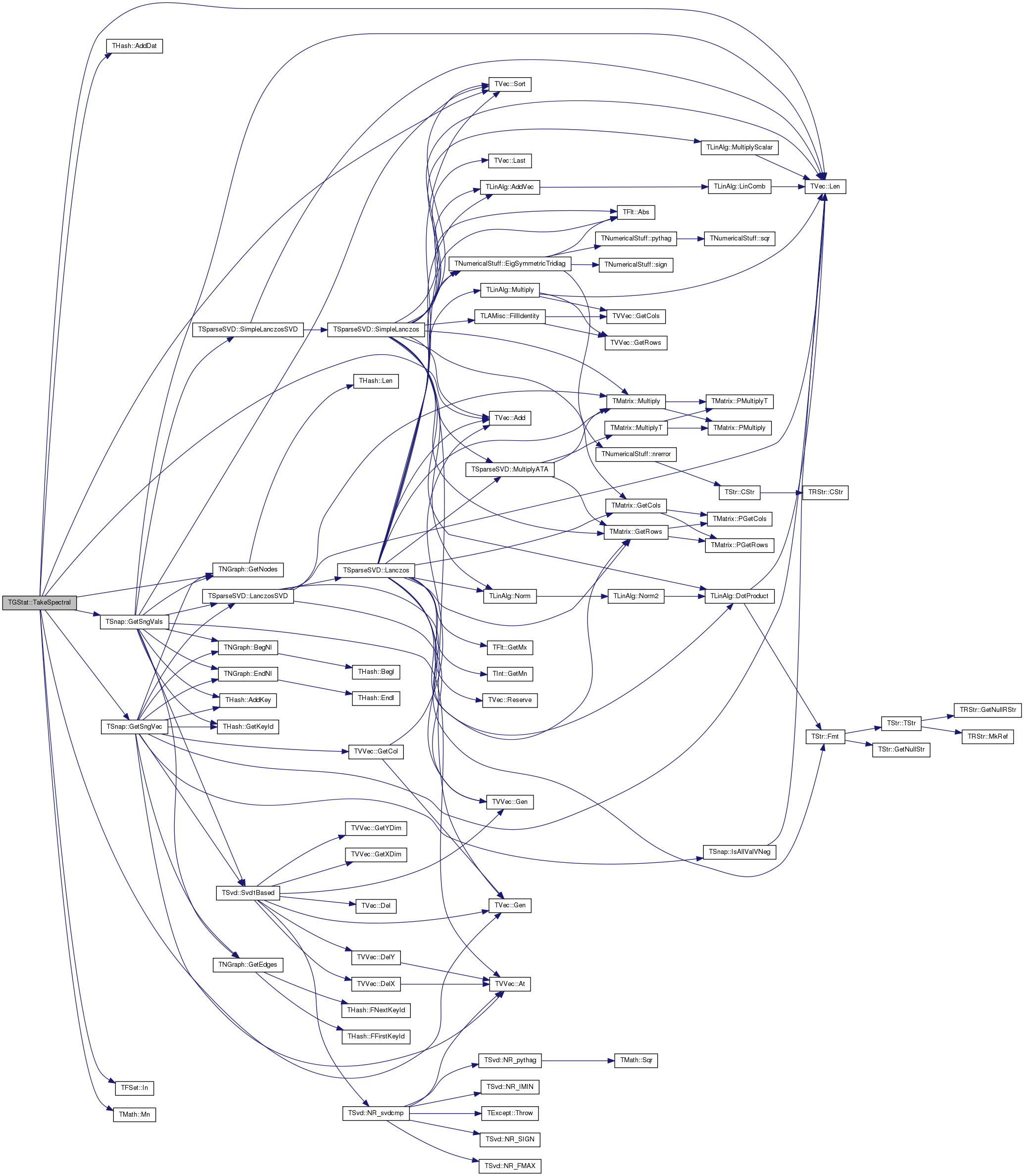
| void TGStat::TakeStat | ( | const PNGraph & | Graph, |
| const TSecTm & | Time, | ||
| TFSet | StatFSet, | ||
| const TStr & | GraphName | ||
| ) |
Definition at line 101 of file gstat.cpp.
References TNGraph::GetEdges(), TSnap::GetMxWcc(), TNGraph::GetNodes(), GraphNm, gsdClustCf, gsdTriadPart, gsdWcc, gsdWccHops, gsvClustCf, gsvEffWccDiam, gsvFullDiam, gsvNone, TFSet::In(), TakeBasicStat(), TakeClustCf(), TakeConnComp(), TakeDegDistr(), TakeDiam(), TakeSpectral(), TakeTriadPart(), and Time.
Referenced by TGStat().
{
printf("\n===TakeStat: G(%u, %u)\n", Graph->GetNodes(), Graph->GetEdges());
TExeTm ExeTm, FullTm;
Time = _Time;
GraphNm = GraphName;
if (StatFSet.In(gsvNone)) { return; }
TakeBasicStat(Graph, false);
TakeDiam(Graph, StatFSet, false);
if (StatFSet.In(gsdWcc) || StatFSet.In(gsdWccHops) || StatFSet.In(gsvFullDiam) || StatFSet.In(gsvEffWccDiam)) {
PNGraph WccGraph = TSnap::GetMxWcc(Graph);
TakeBasicStat(WccGraph, true);
TakeDiam(WccGraph, StatFSet, true);
}
// degrees
TakeDegDistr(Graph, StatFSet);
// components
TakeConnComp(Graph, StatFSet);
// spectral
TakeSpectral(Graph, StatFSet, -1);
// clustering coeffient
if (StatFSet.In(gsdClustCf) || StatFSet.In(gsvClustCf)) {
TakeClustCf(Graph); }
if (StatFSet.In(gsdTriadPart)) {
TakeTriadPart(Graph); }
printf(" [%s]\n", FullTm.GetTmStr());
}
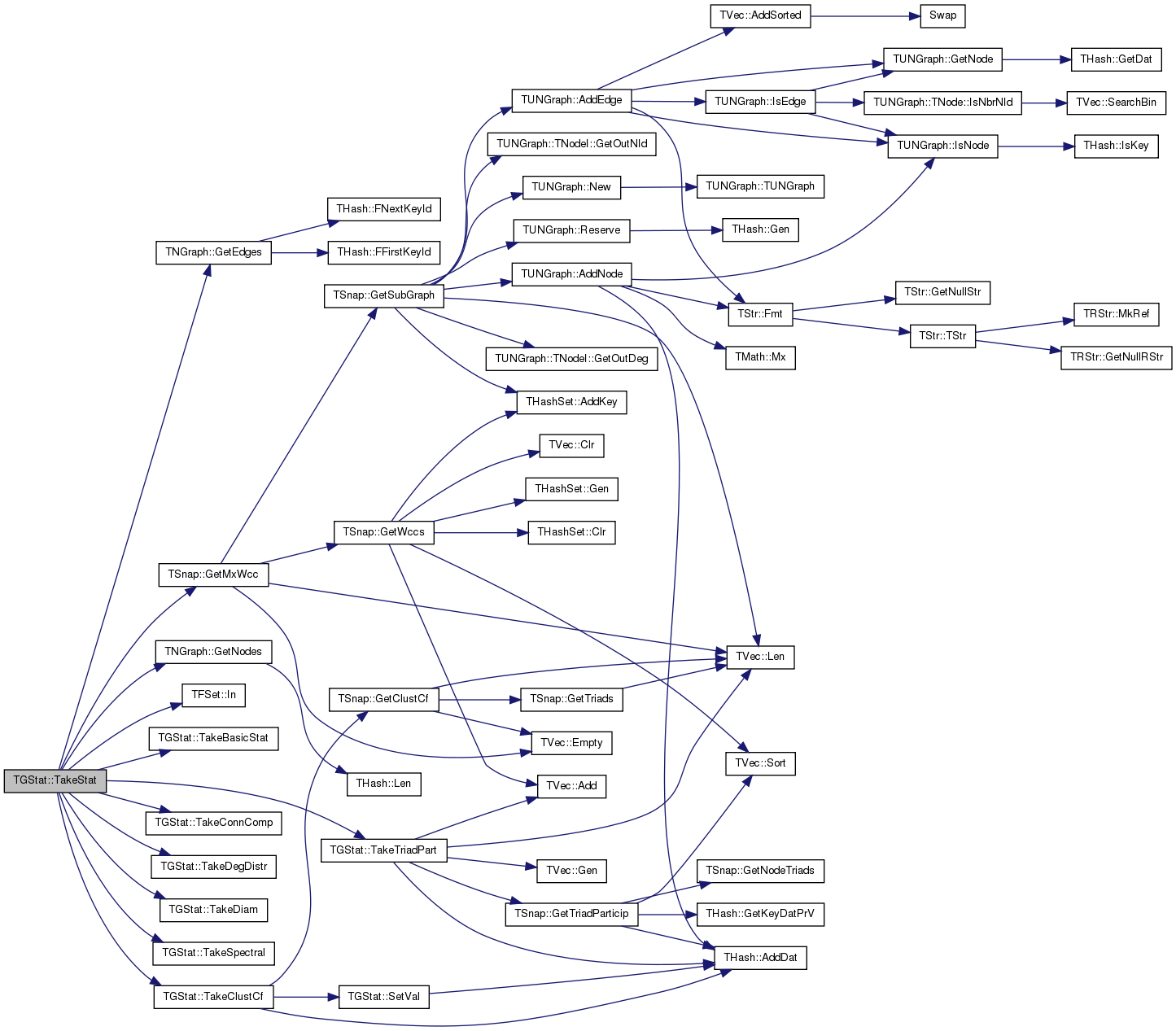

| void TGStat::TakeStat | ( | const PGraph & | Graph, |
| const TSecTm & | Time, | ||
| TFSet | StatFSet, | ||
| const TStr & | GraphName | ||
| ) |
Definition at line 209 of file gstat.h.
References TSnap::GetMxWcc(), GraphNm, gsdClustCf, gsdHops, gsdScc, gsdTriadPart, gsdWcc, gsdWccHops, gsvClustCf, gsvEffDiam, gsvEffWccDiam, gsvFullDiam, gsvNone, TFSet::In(), TakeBasicStat(), TakeClustCf(), TakeConnComp(), TakeDegDistr(), TakeDiam(), TakeSpectral(), and TakeTriadPart().
{
printf("**TakeStat: G(%u, %u)\n", Graph->GetNodes(), Graph->GetEdges());
TExeTm ExeTm, FullTm;
Time = _Time;
GraphNm = GraphName;
if (StatFSet.In(gsvNone)) { return; }
TakeBasicStat(Graph, false);
if (StatFSet.In(gsdWcc)) {
TakeBasicStat(TSnap::GetMxWcc(Graph), true);
}
// degrees
TakeDegDistr(Graph, StatFSet);
if (StatFSet.In(gsvFullDiam) || StatFSet.In(gsvEffDiam) || StatFSet.In(gsdHops) ||
StatFSet.In(gsvEffWccDiam) || StatFSet.In(gsdWccHops) || StatFSet.In(gsdWcc) || StatFSet.In(gsdScc) ||
StatFSet.In(gsdClustCf) || StatFSet.In(gsvClustCf) || StatFSet.In(gsdTriadPart)) {
PNGraph NGraph = TSnap::ConvertGraph<PNGraph>(Graph, true);
// diameter
TakeDiam(NGraph, StatFSet, false);
// components
TakeConnComp(NGraph, StatFSet);
// spectral
TakeSpectral(NGraph, StatFSet, -1);
// clustering coeffient
if (StatFSet.In(gsdClustCf) || StatFSet.In(gsvClustCf)) {
TakeClustCf(NGraph); }
if (StatFSet.In(gsdTriadPart)) {
TakeTriadPart(NGraph); }
if (StatFSet.In(gsvFullDiam) || StatFSet.In(gsvEffWccDiam)) {
TakeDiam(TSnap::GetMxWcc(NGraph), StatFSet, true); }
printf(" [%s]\n", FullTm.GetTmStr());
}
}
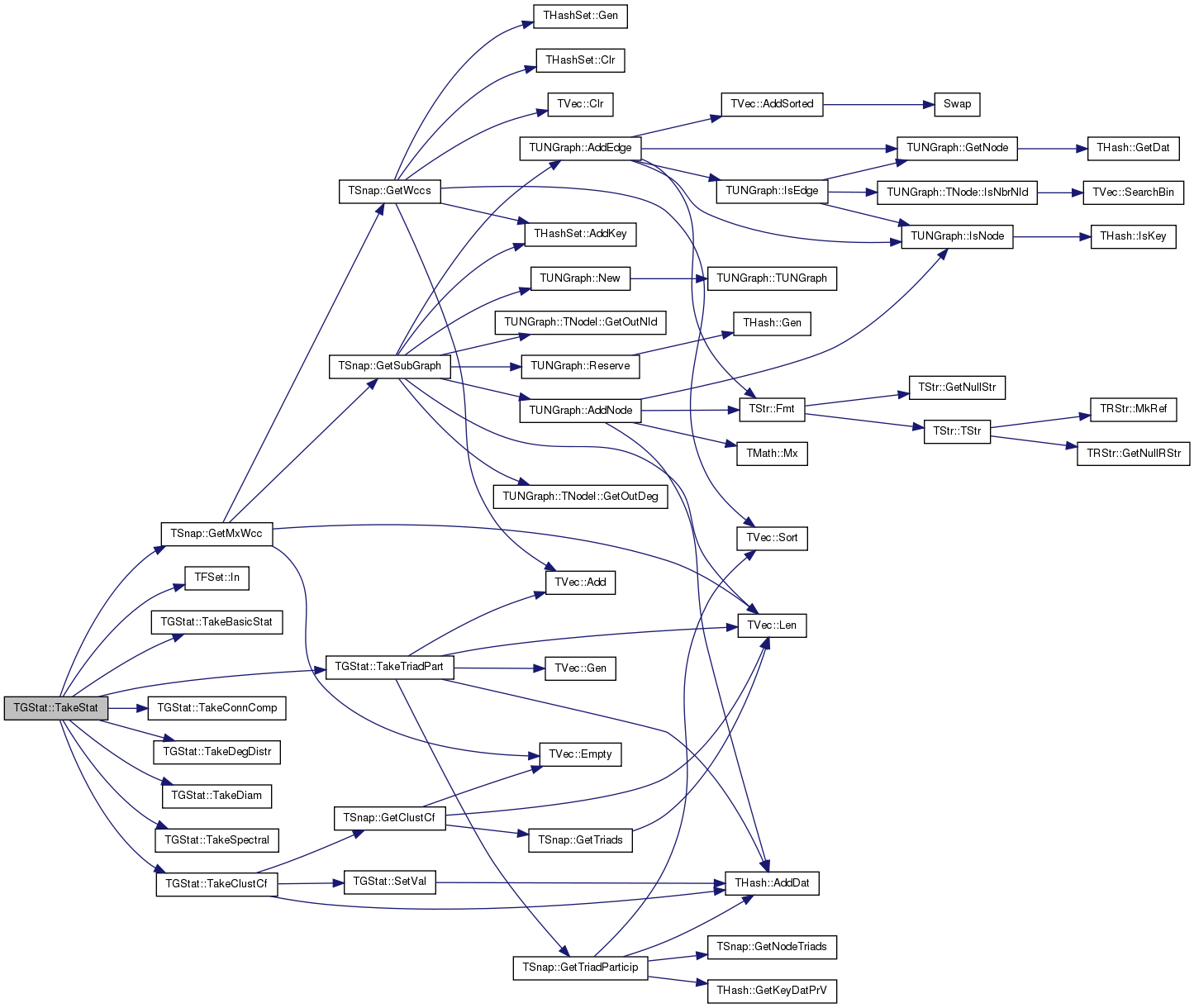
| void TGStat::TakeTriadPart | ( | const PGraph & | Graph | ) |
Definition at line 417 of file gstat.h.
References TVec< TVal >::Add(), THash< TKey, TDat, THashFunc >::AddDat(), DistrStatH, TVec< TVal >::Gen(), TSnap::GetTriadParticip(), gsdTriadPart, and TVec< TVal >::Len().
Referenced by TakeStat().
{
printf("triadParticip ");
TFltPrV& TriadCntV = DistrStatH.AddDat(gsdTriadPart);
TIntPrV CntV;
TSnap::GetTriadParticip(Graph, CntV);
TriadCntV.Gen(CntV.Len(), 0);
for (int i = 0; i < CntV.Len(); i++) {
TriadCntV.Add(TFltPr(CntV[i].Val1(), CntV[i].Val2()));
}
}
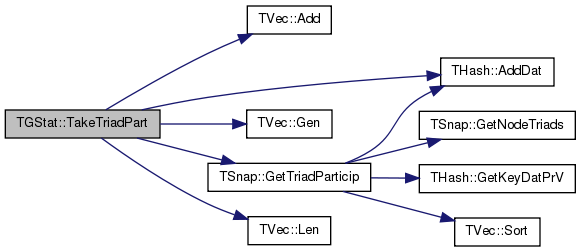

TCRef TGStat::CRef [private] |
Definition at line 57 of file gstat.h.
Referenced by GetDistr(), GetDistrs(), HasDistr(), operator=(), operator==(), Save(), SetDistr(), TakeClustCf(), TakeConnComp(), TakeDegDistr(), TakeDiam(), TakeSpectral(), and TakeTriadPart().
const TFltPrV TGStat::EmptyV = TFltPrV() [static, private] |
Definition at line 51 of file gstat.h.
Referenced by GetDistr().
Definition at line 55 of file gstat.h.
Referenced by AvgGStat(), GetNm(), New(), operator=(), Save(), SetNm(), and TakeStat().
int TGStat::NDiamRuns = 10 [static] |
Definition at line 37 of file gstat.h.
Referenced by TFfGGen::GenFFGraphs(), TakeDiam(), and TTimeNENet::TimeGrowth().
int TGStat::TakeSngVals = 100 [static] |
Definition at line 38 of file gstat.h.
Referenced by TakeSpectral().
Definition at line 54 of file gstat.h.
Referenced by AvgGStat(), GetVal(), HasVal(), TGStat::TCmpByVal::operator()(), operator<(), operator=(), operator==(), Save(), and TakeStat().
Definition at line 56 of file gstat.h.
Referenced by GetVal(), GetVals(), HasVal(), operator<(), operator=(), operator==(), Save(), and SetVal().